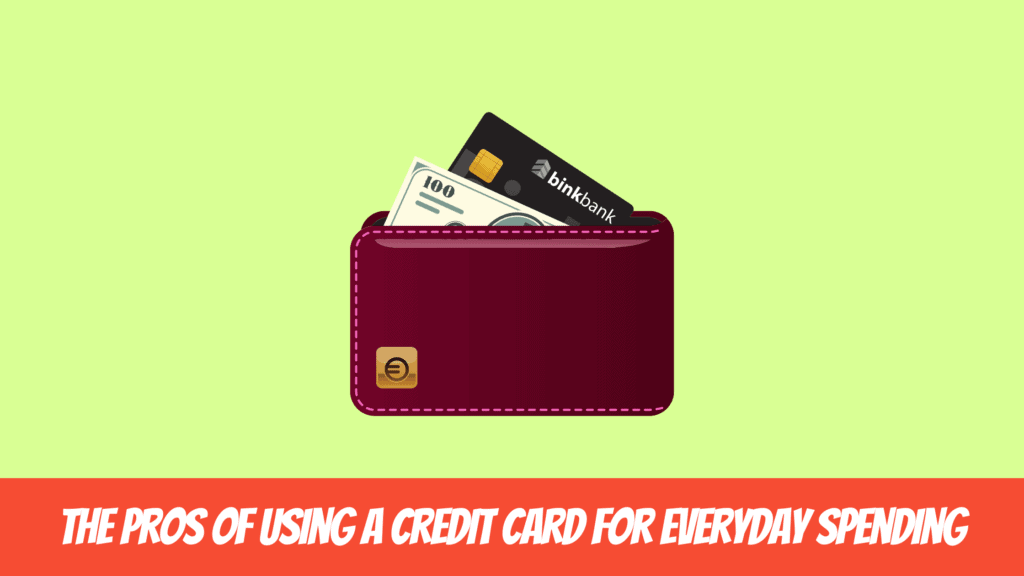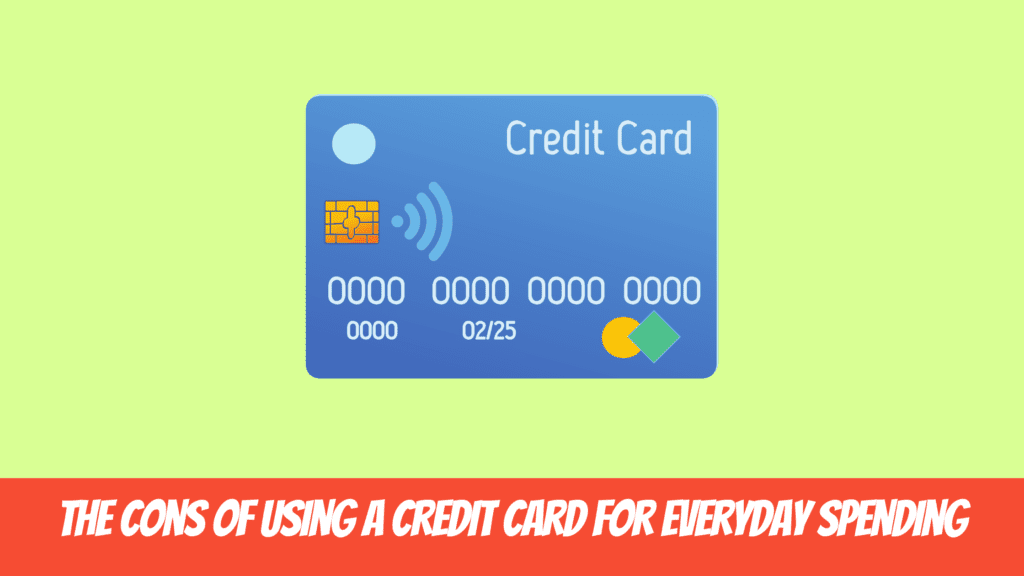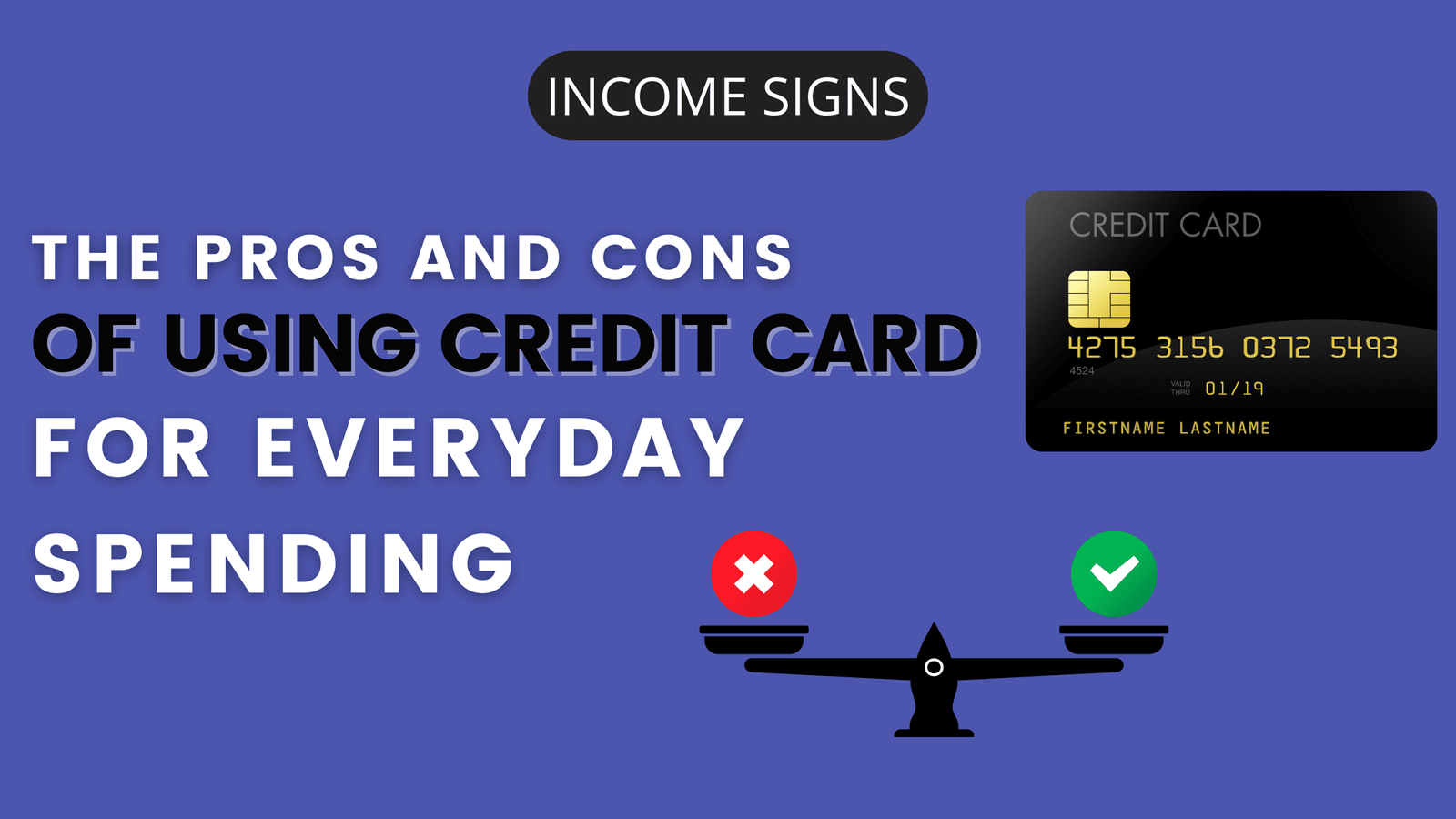Credit cards can be a great tool for managing your finances and taking advantage of rewards, but they come with risks.
Using a credit card for everyday spending has both pros and cons that should be taken into consideration before making the decision to use one.
In this blog post, we will explore the advantages and disadvantages of using a credit card for everyday purchases so you can make an informed decision about whether or not it is right for you.
The Pros of Using a Credit Card for Everyday Spending

Convenience
One of the biggest benefits of using a credit card for everyday spending is the convenience it offers. With a credit card, you can quickly and easily make payments without having to worry about having enough cash on hand or dealing with cumbersome check writing.
Credit cards are widely accepted around the world and can be used in almost any store, restaurant, hotel, airline, and more. Plus, you can also use your credit card for online purchases, allowing you to save time by shopping from the comfort of your own home.
Emergencies
Having a credit card can be incredibly helpful in times of emergency. Not only can it provide access to funds when you need them, but it also has the added advantage of not having to dip into your savings or take out a loan.
This way, you can ensure that your financial resources are still available if needed in the near future, while also avoiding any potential interest payments associated with borrowing money.
Rewards
Rewards from credit cards have become increasingly popular in recent years. With many cards offering cashback or points for everyday purchases, it’s easy to make your spending more rewarding.
Cashback rewards can be redeemed for statement credits or direct deposits into your bank account, allowing you to enjoy the benefits of rewards without having to redeem them for physical items.
Points can be redeemed for a variety of products and services, such as airline tickets, gift cards, and more.
Many cards offer bonus points or miles when you reach certain milestones like spending a certain amount of money in a given time period.
Security
Credit cards provide an added layer of security when making purchases, which safeguards consumers from identity theft and unauthorized transactions.
Most card issuers offer a comprehensive fraud protection policy that covers any fraudulent charges made to the cardholder’s account.
This means that the cardholder is not held liable for any fraudulent charges, as long as they report it promptly to their issuer.
Credit cards often come with additional features such as real-time alerts, transaction monitoring and verification, and additional authentication measures like chip technology or a PIN code.
These measures are designed to combat fraudsters who attempt to use stolen credit cards or other methods of payment fraud. They also help protect the consumer from identity theft by allowing them to easily identify suspicious activity on their accounts.
Track Spending
Credit cards are an incredibly useful tool for budgeting and money management. They provide an easy way to keep track of all your spending since everything will be listed in one statement.
This makes it much simpler to monitor your expenses, as well as stay on top of any potential trouble areas before they become major issues. You can set limits for yourself, or review past purchases to determine where the most money is being spent and make adjustments accordingly.
Build Credit
When used properly, credit cards can be powerful financial tools that allow you to build a strong credit history and reputation. Having a good credit score is invaluable when it comes to getting access to loans, mortgages, and other forms of financing.
By using your credit card responsibly and making payments on time, you can start establishing a positive payment history that will improve your chances of being approved for future lines of credit.
The best way to begin building credit is by starting small and only utilizing what you know you can pay back in full each month. This helps demonstrate your ability to manage money responsibly and make timely payments.
Buy Now, Pay Later
Credit cards provide a great way to purchase items that you may not be able to afford right away. This type of financial arrangement is referred to as “buy now, pay later,” and it allows you to enjoy the item immediately while giving you extra time to pay for it.
With this type of financing, you can create an installment plan with the credit card issuer, which can help you manage your spending while still allowing you to purchase the items that you need.
As long as the payments are made on time, there are usually no extra fees or penalties associated with buy now, pay later options. Buy now, pay later plans provide flexibility and convenience by allowing you to buy what you need without being tied down to one large payment.
This type of financing is also popular among consumers who have less-than-perfect credit since it does not require a credit check or put any debt on their credit report.
Therefore, it is an ideal way for those who may not qualify for traditional financing opportunities to make purchases that they may not be able to otherwise afford.
Travel Benefits
Traveling can be expensive, but many credit cards offer travel benefits that make it more affordable and convenient. These perks typically include no foreign transaction fees, so you don’t have to pay extra when making purchases abroad.
Additionally, many cards offer rental car insurance which provides coverage if there is an accident while using a rental vehicle.
This can save you a significant amount of money and worry so that you can focus on your travels without having to worry about the safety of your car or any unexpected costs.
Peace of Mind
Using credit cards for purchases not only provides a sense of security but also offers added convenience and peace of mind.
With the rise of online shopping, having the option to pay with a credit card can be a lifesaver when it comes to making quick and easy payments.
Credit card companies are also committed to providing customers with fraud protection services, so if there is any suspicious activity on your account you will be alerted right away.
Both federal law and credit card companies offer protection from unauthorized purchases made on your account. If someone uses your card without permission you may be able to get a refund for those charges as long as you report it in time.
All of these safeguards provide an extra layer of protection when making payments which allow consumers to have greater confidence in their financial decisions.
Easy to use
Credit cards are incredibly convenient and provide the ultimate ease of use. Whether you’re shopping online, in person, or at a restaurant, you can use your credit card to make purchases quickly and securely.
Credit cards are an increasingly popular payment option amongst people around the world due to their myriad benefits.
The use of credit cards has skyrocketed over the past decade thanks to their simple accessibility and heightened security measures, allowing consumers access to a plethora of different card types tailored to unique needs and lifestyles.
With so many advantages that come with using credit cards, it’s no surprise why millions opt for them as their go-to payment method!
The Cons of Using a Credit Card for Everyday Spending

High-Interest Rates
The high-interest rates that come with using a credit card can be a real burden if you don’t pay your balance off every month.
It is important to know how much interest you are accruing, as even the smallest of balances can quickly add up over time. For instance, if you have a balance of $100 and an interest rate of 20%, you will accrue $20 in interest each month.
That means that after five months, you would be paying $100 just in interest alone!
To avoid this situation, it is beneficial to set up a budget and track your spending so you can pay off any charges on time and avoid additional fees or penalties.
Fees
Credit card issuers may charge a range of fees for their services, including annual fees, late payment fees, foreign transaction fees, balance transfer fees, and cash advance fees.
Annual fees are typically charged on an annual basis to maintain the credit card account while late payment fees are imposed if payment is received after the due date.
Foreign transaction fees are assessed when the card is used in another country or currency and balance transfer fees and cash advance fees may be applied when transferring funds or taking out a loan from the credit card issuer.
To make sure you understand all applicable charges before applying for a credit card it’s important to review all costs associated with having and using the card.
Doing so will help you avoid unexpected expenses down the road as well as save money in the long run by making sure you’re getting the best deal possible.
Overspending
Credit cards can make it easier to be overzealous with your spending since it doesn’t quite feel like you are actually parting with real money when you swipe away. This can lead to a variety of problems in the future if not managed carefully.
Overspending can allow people to quickly accumulate debts and find themselves in difficult financial situations.
If not kept in check, people could potentially end up digging deeper and deeper into debt, a situation that could become increasingly difficult to escape from.
To prevent such an outcome, it is important to have a clear budget and stick to it in order to manage credit card spending responsibly while avoiding any potential overspending.
Poor Credit
If you don’t take the appropriate steps to manage your credit card responsibly, it can have an extensive, damaging effect on your credit score.
Poor credit management practices can lead to higher interest rates for loans and other forms of credit, as well as additional fees or charges for services that would be available at lower prices if you had good credit.
Having low credit can limit your ability to purchase a home or secure financing from lenders in the future.
It’s therefore essential to develop and maintain healthy financial habits which include making timely payments and staying within your budget when using a credit card.
Fraud
It’s incredibly important to be sure that you are taking the proper steps to protect your credit card from fraudulent activity. While most credit cards come with some type of fraud protection, that doesn’t mean they are completely safe and secure.
It is still essential to take extra measures to safeguard your card, such as never sharing your PIN or account information with anyone else, monitoring your statements for any suspicious activity, and reporting any lost or stolen cards immediately.
Limited Spending
Credit cards have spending limits that can be overly restrictive for many shoppers, especially if they need to make large purchases. This limitation can prevent them from getting the items they require in a timely manner.
Depending on the credit card issuer, these restrictions may vary, for instance, some cards may allow customers to exceed their spending limit but with certain fees, while others may not.
These spending limits are often determined by an individual’s credit score or income level. Someone with a lower credit score or income level is more likely to have a lower spending limit than someone with a higher credit score or income.
Ultimately, these limitations can be frustrating and inconvenient for people who need to purchase expensive items quickly.
Financial Responsibility
Using a credit card responsibly is no small feat. It requires both self-discipline and a deep understanding of different financial concepts.
Before getting a credit card, it’s important to do your research and make sure you understand the different interest rates and fees associated with each card.
Having an understanding of how credit works can help you make responsible decisions when it comes to managing your debt.
Conclusion
Using a credit card for everyday spending can be beneficial in many ways, such as providing rewards and security.
However, it’s important to understand the potential risks associated with using a credit card before you start swiping your plastic.
Credit cards require financial responsibility and discipline to use properly and if not managed correctly, they could lead to debt or poor credit history.
Ultimately, whether or not you decide to use a credit card is up to you but by understanding both the pros and cons of doing so, you can make an informed decision that works best for your individual situation.
